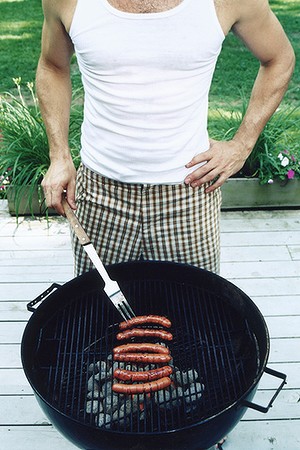
Voiceless is marking March 18 to 24 as Meat-free Week, a week where we should all go 'cordon vert' and give peas a chance.
And in our delightful post-vegie stack era, it's not too difficult to commit. Who wouldn't opt for the transcendental delights of a truffle and taleggio pizza over meat-lover's supreme? Who wouldn't want to emulate sexy celebrity veg-heads like Gaga, Morrissey or Natalie Portman?
There are many reasons to adopt a vegetarian diet. If you're worried about your health, a study in the British Medical Journal found that vegetarians have 40 per cent less risk of cancer.
If you have a sense of empathy, then think about the fact that factory farming is the number one cause of animal cruelty in Australia, resulting in the suffering of more than 500 million animals a year. And if you've noticed our impending environmental apocalypse, then why not heed the UN's official position that a shift to veganism would help save the planet from the worst effects of climate change.
Yet I admit that convincing as these arguments are, they're hard to remember when you're confronted with the unholy combination of beer and your local kebab shop at three in the morning. Some of us need more. And where better to turn to our foresisters, particularly Carol J Adams, who since the 19th century have been explaining how feminism and vegetarianism go together, much like goat's cheese, roast pumpkin and pine nuts.
Here are five reasons why feminists should try to eliminate meat:
1. Eating meat is associated with male power in its most vile and repugnant forms.
In a logic that sounds positively mystical, real men, we are told, should be physically strong and virile, which means killing and eating strong animals.
This is why cookbooks aimed at men focus on the barbecue. Anything less might turn them into gay homosexual fops. For instance, the Newtown killer used a rifle manufactured by a company called Bushmaster. Upon purchase, Bushmaster offers you a "man card" that is revoked if you're caught, among other things, "eating tofu". Why? Because real men eat meat. Sissies do not.
In rejecting meat, feminists – both women and men – are rejecting a potent symbol of patriarchal power.
2. The ill treatment of animals makes the abuse of women tolerable. Following on from my first point, if men get to eat the meat, then women, alas, are consigned to the less savoury role of being the meat. A woman can be hunted like a "bunny" and pursued like a "vixen" or "fox". Women exist as prey. Equating women with animals undermines respect for them because animals are treated so barbarously. When women are likened to animals it means that they exist as objects to be possessed and consumed.
3. Vegetarians, like feminists, care about language. Violence is made possible through euphemistic or derogatory words that distance us from the feelings of the victim. Just as calling a baby cow "veal" makes it more appetising, so too does calling a woman "slut" make it easier to abuse her. We say chicken leg, rather than leg of a chicken, because it helps us not to think of the dead animal, and we say foie gras rather than force-fed geese with exploding livers because the latter is rather off-putting.
Vegetarians, like feminists, are engaged in the process of renaming. "Meat is murder" sang Morrissey, reminding us that meat can only exist if an animal has been killed. Feminists have also spent decades explaining that rape is violence, not sex.
4. Feminists and vegetarians share a common project of ending discrimination based on arbitrary distinctions. We are all, at our base, animals. So why should one animal species be outside the realm of our compassion?
Animals are sentient beings that think, hope and feel pleasure and pain, so why deny them basic rights? Much of the blame falls squarely on the shoulders of Western philosophers who imagined a world where animals and the environment were instruments to human ends. The same body of thought that argued humans were divinely or naturally appointed to rule over animals also thought that men should rule over women and masters should rule over slaves. Might was right.
Feminists have long sought to dismantle these distinctions in the quest for equality, so why would we stop at animals?
5. Feminists and vegetarians believe that the personal is political. Just as we tell male partners that the minutia of who unpacks the dishwasher each night really matters, so too do we need to remind ourselves that what goes into our mouths also matters.
Feminism isn't just about finding things on the internet to hate on. It's also about creating alternative ways of living. It's about forging autonomous identities that try not to mirror oppressive power structures.
Like vegetarians, it's about believing that another world is possible. And the sooner we start living it, the better.


















![BuffyS7SarahMichelleGellarasBuffy1rgb.jpg
FW
Original Message
From Brad Newsome [mailto bnewsome@theage.fairfax.com.au]
Sent Thursday, 3 July 2003 2 56 PM
To 'greenguideage@mailfairfax.com.au'
Subject
Buffy pix for green guide](http://web.archive.org./web/20131011230020im_/http://images.dailylife.com.au/2013/09/20/4765225/tm-38129087-90x60.jpg)

